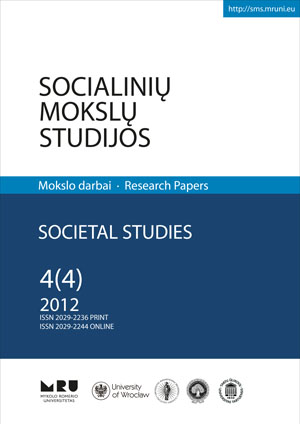Savireguliacijos poveikis jaunųjų mokslininkų ugdymo kokybei (disertacijų gynimo tarybų veikla
Self–Regulation Impact on the Quality of Researcher Education
Author(s): Daiva Mažrimienė, Birutė MikulskienėSubject(s): Social Sciences
Published by: Mykolas Romeris University
Keywords: higher education quality; research output assessment; self-regulation; social network analysis
Summary/Abstract: For the process of awarding a doctoral degree (DDA), peer review is used as a major formal procedure that is implemented via committees gathering researchers who have proven excellence record. Special DDA committees are nominated with the purpose to assess the research outputs of candidates and evaluate new researcher abilities to work as researchers in the future. The way committees are established and the personalities involved in them are under the responsibility of the university, which establishes a doctoral programme based on the university autonomy mode. Autonomy could be analysed as a self-regulation mode. Selfregulation as an antipole of external governmental regulation is the point of balance between the internal commitments of the institution for research excellence and the external control of the institution to pursue quality in a researcher training. The DDA process is reviewed in this article. The article aims to analyze the practice of the DDA process and to reconstruct the committee structure through social network analysis and searching to measure the self-regulation impact on the performance of DDA process. The DDA data published in 2010-2011 in Lithuania were chosen for the breadth of the analysis. The total research data set covered 831 DDA cases and a network of 2711 nodes when 1880 nodes represent the committee members. The analysis has shown that out of 1880 committee members, 56% are involved once in the DDA process, while 42% of nodes (885) represents their selves in the network 2-5 times and 8% of researchers (178) were nominated as doctoral candidate recognition members more than 5 times (1 researcher participated in this process 32 times, 2 members—22 and 25 times respectively). The interesting results have been revealed from the ego-network studies: the two most prominent members form independent subnetworks have no interconnections. Those results allow us to conclude that DDA committees have a tendency to settle on stable compositions without attempting even a minor change. This lets us draw the conclusion that the self-regulation mode is less competitive and expresses tendencies to work in a more closed environment trying to avoid outer influences.
Journal: Socialinių mokslų studijos
- Issue Year: 4/2012
- Issue No: 4
- Page Range: 1397-1416
- Page Count: 20
- Language: Lithuanian

